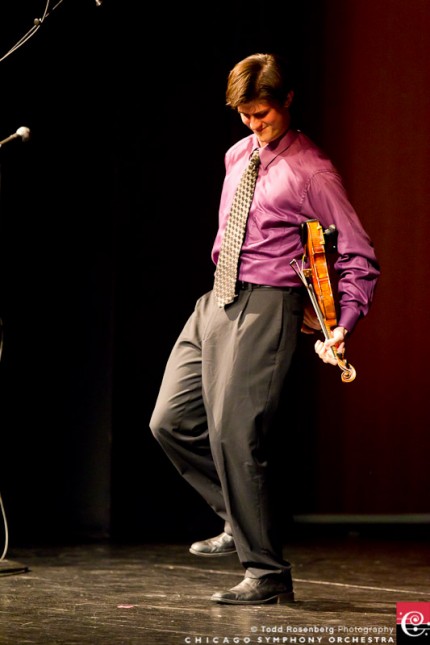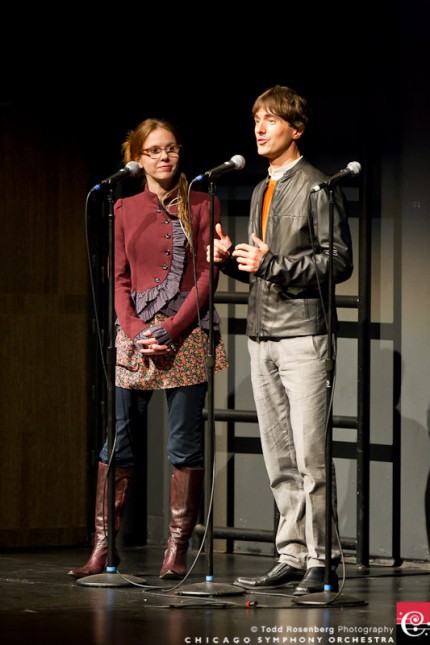MusicNOW offers a bravura plugged-in season opener

Violinist Nigel Armstrong performs John Corigliano's "Stomp" Monday night in the CSO's MusicNOW concert at the Harris Theater. Photo: Todd Rosenberg.
The season-opening concert of MusicNOW Monday night at the Harris Theater in Chicago offered a model of how these evenings should be presented with a tight, varied program of five contemporary works with four of the composers present to introduce their music.
Mason Bates and Anna Clyne, the Chicago Symphony Orchestra’s two composers-in-residence, were the engaging young curator-hosts, and while there were a few glitches Monday night, for the most part, the concert got the CSO’s new-music series off to a worthy start.
John Corigliano’s Stomp (2010) certainly began the evening on a bravura note (many notes actually). Written as a violin competition piece for the 2011 Tchaikovsky Competition, Stomp calls for non-standard tuning on two strings, an ease with populist American fiddle styles of jazz and bluegrass and rhythmic cunning in coordinating foot stamps with the violin part.
Corigliano noted approvingly in his video introduction that Nigel Armstrong, who performed Stomp in Moscow, elected to add to the theatrical complexities by playing one section of the six-minute work with the violin behind his back. The young violinist blazed through the complexities of the work Monday with rock-like abandon and apt show-biz panache.
Kirsten Broberg’s That Time (2008) is the final section of a larger six-section extended work (The Water of Time) on poems of Pablo Neruda. Set for voice, violin, cello, alto flute, clarinet, piano, percussion and electronics, this is wistful, flowing music that achieves a transcendent beauty spiced by piquant instrumental touches. Soprano Carrie Henneman Shaw possesses a bright, youthful timbre that at times sounds uncannily like Dawn Upshaw. Unfortunately, she doesn’t have Upshaw’s projection and clarity and Shaw’s words were largely undecipherable Monday, not helped by projected lyrics that were out of synch from the get-go. The ensemble was sensitively conducted by Cliff Colnot.

CSO composers-in-residence Anna Clyne and Mason Bates were the hosts for Monday's concert. Photo: Todd Rosenberg.
Tumblers (1990) by Alejandro Viñao is a study in shifting pulses for amplified violin, marimba and electronics. Asymmetric riffs are voiced, repeated and mutated in a series of overlapping rhythms and computerized swells and crescendoes. Plugged-in violinist Yuan-Qing Yu and the acrobatically virtuosic percussionist Cynthia Yeh provided fine advocacy, yet, like many a rhythmically-centered electronic piece, at 17 minutes Tumblers goes on far too long for its own good.
Paula Matthusen’s run on sentence of the pavement (2002) “for piano, electronics and pingpong balls” sounds like an example of aleatoric gimmickry at its worst but actually proved one of the highlights of the evening. The score creates a variety of contrasting timbal and color effects by dropping pingpong balls on the piano’s strings and soundboard, the resulting noises echoed and electronically distorted. Matthusen’s work weaves a variety of amplified timbres and rhythmic fragments into a haunting, swirling landscape of gamelan-like sonorities, ethereal high-piano chords and bracing percussive punctuation. Amy Briggs was the dexterous and versatile piano soloist.
The final work, Dennacha Dennehy’s To Herbert Brün (2001), offered the strongest meat of the evening. Scored for soprano, tenor trombone, tenor saxophone, double-bass and electronics, this homage to the Irish composer’s teacher requires the vocal soloist to emit a series of shrieks, urgent whispers, mutters, wails and moans.
There are clear jazz influences in Dennahy’s angular rhythms, free-form style and extended vocal and instrumental solos. Yet in the final section with its thunderous, widely spaced chords, unsettling colors and bleak, baleful expression, the music moves into a kind of electronic death-metal landscape, gaunt, powerful and chilling.
Soprano Shaw tackled all the Berio-like vocal demands with daunting fire and commitment. Under the tight direction of Colnot, trombonist Charles Vernon, saxophonist Jeremy Ruthrauff, bassist Daniel Armstrong and Mason Bates working the boards, were equally full-blooded partners.